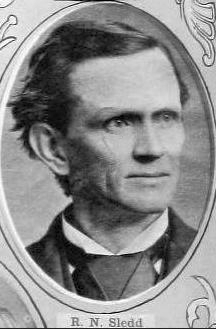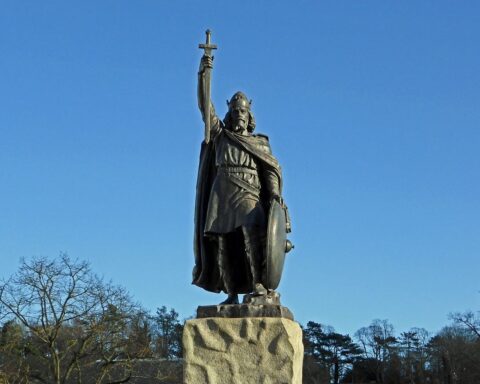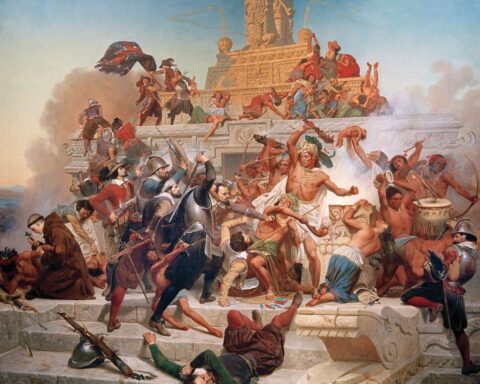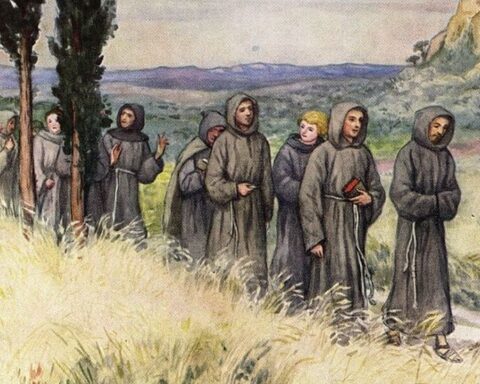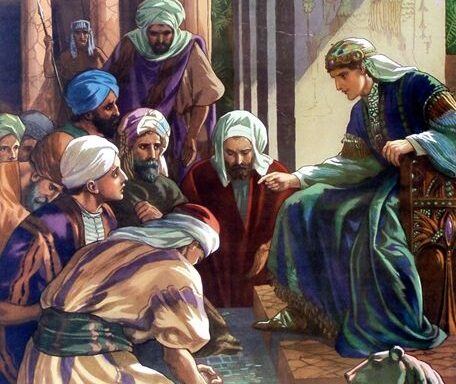Editor’s note: The following is extracted from True Heroism and Other Sermons, by R. N. Sledd (published 1899).
“I was glad when they said unto me, Let us go into the house of the Lord, Our feet shall stand within thy gates, O Jerusalem,” &c. — Psalms cxxii.
It is supposed by some expositors that this Psalm was written immediately after Absalom’s overthrow and before David’s reinstatement on the throne; others think that it was composed after Cyrus issued his proclamation liberating the people from their seventy years’ captivity, and while they were preparing to return, or were already returning to their own country; there are others who think it was written on the eve of some one of their great religious festivals, and was used by the people as they went up from all parts of the country to the holy city. It was well suited to either of these occasions.
But its date, authorship, and the circumstances that inspired it, are of far less interest and importance to us than its subject matter, the spirit that breathes through it, and the sentiment to which it gives expression. It is evidently the work of a consecrated genius, the utterance of a soul sweetly attuned to spiritual harmonies, a heart deeply in love with divine things. Whatever its literal sense, we do not put a forced construction on it when we give it an entirely spiritual application. Its author could not have described in terms more forceful and beautiful the believer’s love of the church, his delight in her ordinances and his interest in her welfare. If in our meditations on it, we can only catch the spirit of his fervor and kindle the fire of our love into an intenser glow, it will not be in vain that we have come up “unto the testimony of Israel, to give thanks unto the Lord.”
To undertake to prove that the Christian loves the church, would be a waste of time. Every believing soul immediately responds to the statement, out of its own experience affirming its truth. When we sing, “I love Thy kingdom, Lord,” we do not utter a merely poetic sentiment, but a truth attested by the Christian consciousness everywhere and al ways. The Psalmist does not express the feeling too strongly when he says, ” If I forget thee, O Jerusalem, let my right hand forget her cunning. If I do not remember thee, let my tongue cleave to the roof of my mouth; if I prefer not Jerusalem above my chief joy.” “I had rather be a doorkeeper in the house of my God, than to dwell in the tents of wickedness.” Nor is this love confined to the spiritual facts and elements of the church, but embraces the material also; “Thy servants take pleasure in her stones, and favor the dust thereof.” Her grounds, her walls, and towers, her pulpit, pews and altars, hallowed by precious memories and consecrated by the manifest tokens of the divine presence and favor, are all dear to the hearts of her children. To know nothing of this love for the church is just cause for apprehension, and any positive indifference may well excite alarm. Indifference to the church, the body, is indifference to Christ, the Head; and indifference to Christ at once seals our condemnation.
This love is not a blind, unthinking devotion. It has its source in an intelligent appreciation of the intrinsic worth and loveliness of its object. The church commands the admiration of angels as well as of men. And it is not possible for one to contemplate its spiritual beauty and glory, and experience the grace which comes to men through its agencies and not have the fire of a holy affection for it enkindled in his heart.
Why did the Psalmist love Jerusalem? In the answer to this question we have the reasons for our love of the church.
He loved Jerusalem because of its compactness, its strength and stability; its buildings were not scattered over a wide extent of country, but were contiguous and thus each strengthened and supported the other. Its streets were spacious and fair, and its walls and towers were massive and formidable.
The Jebusites having been expelled, the population was homogeneous. They were of one blood — heirs of the same promise, having a common faith and hope. While, therefore, it was “built as a city that is compact together” in a material sense, it was compacted, cemented, by the tenderest and strongest of all ties, those of family and religion.
The church, the city of our God, is built after a plan on which divine wisdom and love have lavished the resources of infinite skill. It rests on a foundation more stable than the ribs of stone undergirding Jerusalem. It is built of materials cut from the quarries and forests of humanity, and squared, polished and fitted to their places by the eternal Spirit. And as we “walk about Zion, and go around about her, tell the towers thereof, mark well her bulwarks and consider her palaces,” we see unity, compactness and strength in every part.
There is unity of doctrine. Its doctrinal system, beginning with the being and perfection of God and culminating in the glorification of redeemed humanity, is an orderly and compact arrangement of truths profound and glorious, such as it never entered into the heart of man to conceive. These truths have their source and reason in the divine wisdom, are perfectly adapted to human need and in their application and results glorify their Author. They are perfectly adjusted one to the other. Each one is essential to the completeness and harmony of the system. So compacted are they that no philosophic acumen or logical skill, and no ingenuity of human or hellish hate can dislodge one of them from its place.
There is unity of character and life among the inhabitants of this spiritual city. They are gathered from every nation, tribe and tongue; but they are all of one blood; they bear the same family likeness; they speak the same language. Washed in the blood of the Lamb, born of the Holy Ghost, renewed after the image of God, they have “one Lord, one faith, one baptism, one God and Father of all, who is above all, and through all, and in them all.” They all drink of the same fountain of holy joy, and are all partakers of the same glorious hope. They are one in life, in love, in interest and aim. Thus compacted together, how sweet their communion. What weapon that is formed against them can prosper? “Strong in the strength which God supplies through His eternal Son.” They are invincible and triumphant. The Jerusalem of old, so compactly built, so strongly fortified, so enthroned in the love of her people and so bravely defended, has long since been shorn of all her ancient glory; but against this Jerusalem, which is from above, the gates of hell shall never prevail.
He loved Jerusalem because it was the seat of the national worship. “Thither the tribes went up, the tribes of the Lord, unto the testimony of Israel, to give thanks unto the name of the Lord.” David built a tabernacle on Mount Zion. He brought the ark of the Lord from the house of Obededom and placed it in the tabernacle. He placed an altar of incense in the holy place before the veil and an altar of burnt offering in the court before the tabernacle. He divided the priests into twenty-four classes, ordaining that each class should serve a week at a time. He organized a great choir of four thousand singers and players on instruments. He put in operation all the machinery of their imposing ritual on a grander and more impressive scale than ever before in their history. And now from all parts of the kingdom three times a year the people gathered in Jerusalem. They come for instruction in the testimonies of the Lord, to consult His oracles, and to hear what He will say unto them. They come to present their offerings of thanksgiving and of expiation. While they thus honor Him, they commune one with another, and strengthen the bonds of mutual friendship and affection and intensify the ardor of their patriotism.
The church is “the true tabernacle which the Lord pitched and not man.” In it God deposits His testimony, not tables of stone, but the completed revelation of His truth and grace. Here is also an altar of sacrifice, an altar of incense, a mercy seat, an atoning Lamb and a great high-priest. Here, too, is the presence of God, not the dazzling splendor of the shekinal glory but His spiritual presence in the word, in His sacraments, and in the believing soul sanctifying it unto Himself and imparting to it the joy of His great salvation. He is ever thus in the congregation of the righteous.
Thither His people go up, not under the compulsion of a stern command, but under the sweetly impulsive force of love divine. In the religion of the gospel there is a sort of spiritual magnetism. It draws human hearts together. As soon as a man comes into the experience of its saving grace he wishes to find someone else who is in its enjoyment. The assembling of Christians together is but the natural working of this attractive power. Let a number of them, strangers to each other, go into a strange community; they have never heard each others’ names; they are not brought into business or social relations with each other; they do not cross each others’ path in every day life; yet they soon find each other out and are taking sweet counsel together. Those who are alive in Christ will come together. There is no need for any such command as was given to the Jew, nor for the exhortation of the apostle, “Forsake not the assembling of yourselves together,” while the heart is aglow with the love of Christ. There is in such souls a yearning which nothing will satisfy but the communion of saints.
They come to talk of His righteousness and of all His wondrous works; of their hopes and fears, their trials and triumphs; and to gather new courage and strength for the toils of the way. While they talk, God hearkens and hears. They see not the outspread page and the moving pen, but a book of remembrance is being written before Him for them that fear the Lord and think upon His name.
They come to give thanks unto His name for the tokens of His love that crowd their lives; to praise Him for His goodness and truth, for the riches of His grace and the wealth of His glory; for His work for them as sinners, His work in them as penitent believers, and for the blissful hope of the rest of heaven.
They come to make prayer and supplication for His continued blessing; for the guidance of His hand and the protection of His power; for the abiding witness and sanctifying power of His Spirit and the comforts of His grace. And not for themselves only do they pray; but also for the dear ones of their homes, for their brethren in Christ, and for the great outside world. As the smoke of the burning incense ascended, filling the sanctuary with its fragrant cloud and diffusing its odors through all the court, so their prayers ascend to God as sweet incense kindled with the fire of humble trust and holy love.
They come to hear what God the Lord will speak; to listen to His word as read and expounded by those whom He has called and commissioned for this special work. In hearing His ministers they hear Him; and with reverence and faith they feed on the milk and strong meat of the word. It is sweet to their taste, satisfying to their longing appetite, strength to their souls and the joy and rejoicing of their hearts. And as faith comes by hearing and hearing by the word of God, listening to the truth as delivered by a living ministry they are equipped for the fight and the victory of faith.
He loved Jerusalem because it was the’ royal city; “There are set thrones of judgment, the thrones of the house of David.” It was the seat of royal authority, power and splendor. There were gathered the ministers of state, the mighty men in counsel and in war, as well as the dignitaries of religion. Thence royal decrees were issued. There honors were conferred, rewards for faithful service bestowed, and justice administered. There were originated and put in motion those potent influences and agencies that moulded public opinion and character, quickened the patriotism of the people, developed the material and moral strength of the kingdom and prepared it for either defence or aggression as the public interest might require.
The church is the city of a King. It is God’s capital on earth. In it is the throne of “the Prince of the house of David,” at once David’s son and David’s Lord. To Him all power is given in heaven and in earth. To Him has been committed the administration of the affairs of God’s gracious kingdom. The end at which He aims is the complete overthrow of the powers of darkness and the subjugation of all things unto Himself. In the fulness of time, this aim will be triumphantly accomplished.
He carries forward His work in the world through the church as His instrument. In and through the church He puts in operation those spiritual forces whereby His people are unified, matured, strengthened and fitted for effective service. By the church He publishes His will — the law which condemns and the gospel which redeems, pardons and saves. The church in her collective capacity, with all her intellectual and moral power, with all her spiritual gifts, and with all her material resources, He commissions to preach the gospel to every creature. It is in the church that He originates and organizes those agencies whereby humanity shall at last be liberated from the bondage of Satan. There is not on earth an organization at work for the suppression of vice, the overthrow of sin and the promotion and establishment of holiness that is not the product of influences generated in the church. Nor is there power to achieve such ends lodged anywhere on earth except in the church. The oracles of heathenism are dumb, proud philosophy bows her head in silence, and all the devices of worldy wisdom and ingenuity are powerless when confronted by the mighty problems of human depravity and guilt, human deliverance, and the tremendous issues of the world to come. But from His throne the King makes proclamation: “The Spirit of the Lord God is upon me, because He hath anointed me to preach the gospel to the poor: He hath sent me to heal the broken hearted, to preach deliverance to the captives, and recovering of sight to the blind, to set at liberty them that are bruised, to preach the acceptable year of the Lord.” The church is at once the living witness of the truth of His mission and the reality of His saving and keeping power and the channel of its communication to the world.
If then the church is thus beautiful in her unity and glorious in her strength, holy in her worship and heavenly in her aims and hopes, the dwelling place of our King, the medium of all spiritual blessing, the joy of Christ and the wonder of angels, Christless and cold must be that heart that does not glow with love for her courts.
Wherever real love for the church exists it will find expression. It cannot, be concealed. It does not seek or desire to be hidden. To attempt to hide it is to smother and extinguish its fire. It will manifest itself in many ways:
In a glad appreciation of the ordinances of the church and in the improvement of its privileges. “I was glad when they said unto me, Let us go into the house of the Lord.” We know what gladness is; we have seen its smile on the face of nature and heard its song in the myriad voices of field and forest, in the prattle and laughter of infancy and in the sportive shouts of boyhood. We have seen its light kindling in the sunken eye of poverty and its silver lining on the dark clouds of sorrow. We have felt it when our worldly hopes have been realized; when we have looked in the face and grasped the hand of the friend of other days; or when the loved one of our home has been returned to us from the mouth of the grave. But far deeper, richer still, was our experience of it in that “blest hour when from above we first received the pledge of love,” when we first felt the loving arms of Jesus about us and heard the whispers of His grace in our hearts. Though many years may have passed since that hour the memory of it still makes us glad, and will make us glad forever. Akin to this is the feeling of the lover of Christ and His church towards the ordinances of His house. “I was glad” — felt a profound satisfaction of soul, an exultation of spirit and an eagerness of anticipation — “when they said unto me, Let us go into the house of the Lord.” No proposition could be more welcome, and no errand more delightful. The tents of wickedness, the shops of vanity, the gilded halls of frivolity with all their fascinating splendors, what are they when compared with the place where His honor dwelleth? What are bleak winds and clouded skies when He opens His gates, and opens wider still His loving arms to take me to His embrace? Nor will we measure our communion with Him by the minute. We say we hope to “dwell in the house of the Lord forever,” and anticipate eternal fellowship with Him as the consummation of the joy of heaven. To count the moments now or grow weary of the brief hour of His worship, casts suspicion on the reality of our gladness in the privileges of His house and the truth of our professed hope for the future.
In prayer for its welfare. This will follow as a necessary fruit of real love for the church. There will be prayer for its peace. It ought to be a haven of repose where weary, troubled hearts, burdened by the cares and tossed by the storms of the world, may find rest. Love unfeigned should reign in every heart. As envies, jealousies, strifes and hatreds not only mar its beauty but paralyze its energies, destroy its spiritual influence and grieve the Holy Spirit, the faithful, loving soul is ever praying that no breath of discord may disturb its holy serenity. It is not prayer for peace with the world. This can only be secured at the cost of fidelity to Christ. There can be no compromise to win its friendship. That friendship, when won, “is enmity with God; whosoever therefore will be the friend of the world is the enemy of God.” To court its favor by complaisance or surrender is to forfeit all claim to its respect, wound our own conscience and dishonor God. Let the lines be clearly drawn; let the separation be complete ; let the antagonism between the friends and the enemies of Christ be sharply defined, and let the conflict be irrepressible; but let peace, mutual sympathy and love reign in all the borders of Zion.
There will be prayer also for prosperity — the prosperity that consists in spiritual development and fruitfulness; in growth in grace and in the knowledge of Jesus Christ; in increased faith and love, Christian activity and power, resulting in the awakening and salvation of the ungodly and the edifying and establishing of them that believe. The reasons for such prayer are twofold; one reason is personal, the other relative; first, for my own sake, and second, “for my brethren’s and companions’ sakes.” Our individual welfare is, to a great extent, dependent on the peace and prosperity of the church. We cannot shake off the influence of our surroundings. Let the church be rent by feuds, or let general spiritual deadness prevail, and, fight against it as we may, our hope will decline and our love grow cold. We mourn, we weep, we pray, and yet find ourselves sinking down to the level of those about us. So with those we love. Our brethren in Christ, our brethren after the flesh, the companions of our life abroad, the companions of our life at home, our sons and our daughters, all have immortal interests at stake. Their spiritual fortunes, as well as our own, are involved in the condition of the church. Ordained to save, through human weakness and passion, it may become the occasion of their final overthrow. But let “peace be within her walls and prosperity within her palaces;” and from her courts streams of spiritual life will flow out, watering arid refreshing our hearts and our homes, and making the desert to blossom as the garden of the Lord.
This love will manifest itself in earnest, active effort to promote the welfare of the church. “I will seek thy good.” This is more than thinking about its good; more than talking about it with our friends; more than personal enjoyment of its privileges; more than the most fervent prayer for its peace and prosperity. This is the culmination of all, the crowning proof of the sincerity of our prayers, the reality of our enjoyment and the honesty of our expressions of interest. “I will seek thy good.” Too many of us stop short of this. We are willing enough to think and talk, and enjoy, and pray. But when work is to be done, others must do it; when burdens are to be borne, or sacrifices to be made, or hardships endured, we begin to make excuse. But what avails all our praying if there be no corresponding effort. The true lover of the church will not, cannot, rest in singing psalms and in vociferous prayers and shouts. He is ready for any service for the honor of Christ and the good of Zion. His language is, “All to thee I owe! all to thee I give; soul, body, spirit, intellectual gifts and acquirements, position, influence, means, all are thine. Here am I, Lord; send me on any errand; use me in any work; lay upon me any burden, that will promote the good of the church and glorify thy grace.”
O King of Zion, breathe into the hearts of all Thy servants; kindle their love into a flame that will burn out all the dross of irresolute purpose, worldly conformity and selfish aim, and give them that spirit of complete devotion and that strength of soul that will inspire and enable them to toil without weariness for Zion’s good.
